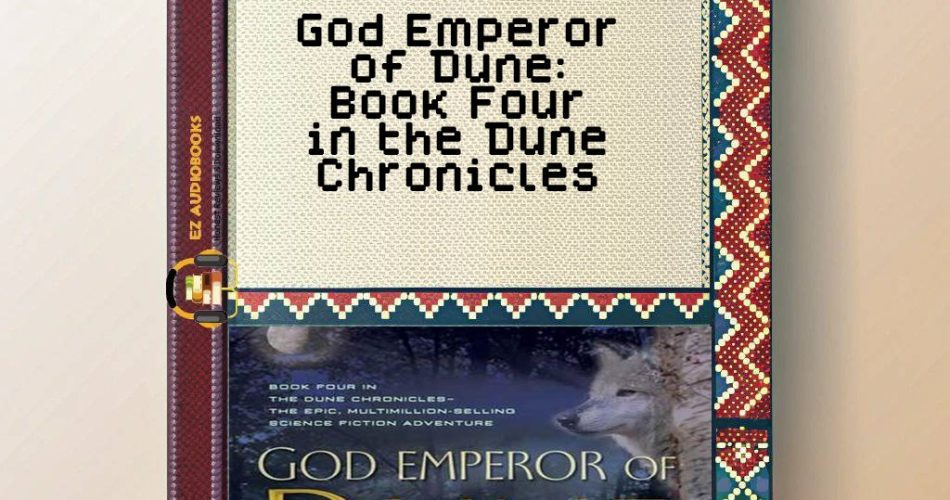Audiobook Sample
Listen to the sample to experience the story.
Please wait while we verify your browser...
- Title: God Emperor of Dune: Book Four in the Dune Chronicles
- Author: Frank Herbert
- Narrator: Katherine Kellgren, Scott Brick, Simon Vance
- Length: 15:48:23
- Version: Abridged
- Release Date: 24/06/2008
- Publisher: Macmillan Audio
- Genre: Science Fiction & Fantasy, Science Fiction, Science Fiction & Fantasy, Science Fiction, Science Fiction & Fantasy, Science Fiction
- ISBN13: 9.78E+12
Frank Herbert’s “God Emperor of Dune” stands as one of the most philosophically dense and structurally ambitious entries in the Dune Chronicles, and experiencing it through the audiobook format offers a uniquely immersive encounter with Herbert’s vision. As someone who has spent years analyzing narrative structures across cultures – from Murakami’s layered realities to the epic traditions of Asian literature – I find Herbert’s temporal and thematic scale particularly fascinating. This audiobook, narrated by the formidable trio of Katherine Kellgren, Scott Brick, and Simon Vance, transforms Herbert’s complex meditation on power, evolution, and destiny into a compelling auditory experience.
“The Weight of Three Millennia”
More than three thousand years have passed since Paul Muad’Dib’s rise, and Herbert uses this vast temporal gap to explore how power distorts even the most noble intentions. Leto Atreides, now a hybrid of human and sandworm, embodies the ultimate paradox of the benevolent dictator. The audiobook format accentuates the eerie timelessness of Leto’s reign – Vance’s measured delivery of Leto’s monologues creates an almost liturgical quality, reminding me of listening to Buddhist sutras during my research in Kyoto. There’s a rhythmic, meditative quality to these sections that print can’t quite capture.
“Narrative Alchemy: The Trio of Voices”
Kellgren, Brick, and Vance each bring distinct textures to Herbert’s universe. Kellgren’s precision with the Bene Gesserit dialogues – particularly Siona’s rebellious intensity – echoes the feminist undercurrents I often highlight in my comparative literature courses. Brick, a veteran of Dune narrations, grounds the political machinations with gravitas, while Vance’s Leto oscillates between tragic self-awareness and chilling detachment. Their interplay mirrors the novel’s central tension between human frailty and cosmic ambition.
“Themes Through a Cultural Lens”
Herbert’s exploration of forced evolution resonates deeply with East Asian narratives of transformation – think “Journey to the West”‘s Monkey King or the bio-spiritual themes in “Akira”. The audiobook heightens these parallels, especially in scenes where Leto’s voice literally “changes” as Vance subtly modulates his tone to reflect the character’s hybrid nature. This auditory shape-shifting made me recall my seminar at Berkeley, where we debated how audiobook narrators function as modern-day “griots”, preserving and transforming oral traditions.
“Structural Innovations and Challenges”
Herbert’s reliance on philosophical dialogue over action may test some listeners – the debates between Leto and Duncan Idaho (Brick at his sardonic best) demand patience. Yet, the format rewards attentive engagement. The scene where Leto describes his ‘Golden Path’ as a river of time reminded me of sitting by the Kamogawa River in Kyoto, watching centuries flow past. Such moments reveal Herbert’s genius: he turns abstraction into sensory experience.
“Audiobook-Specific Brilliance”
The production wisely uses subtle sound design – wind whispers during Arrakis scenes, faint echoes in Leto’s throne room – to avoid overwhelming the text. This restraint contrasts with my students’ experiments in multimedia storytelling, where overproduction often dilutes narrative power. Here, silence becomes a character, emphasizing the weight of Leto’s isolation.
“Critique and Context”
While the narration excels, Herbert’s dense prose occasionally overwhelms the audio format. Sections on Tleilaxu genetics or the intricacies of Leto’s breeding program benefit from print’s rereadability. However, the narrators’ emotional intelligence compensates – Vance’s pause before Leto’s confession, “‘I am a predator,'” lingers like a struck gong.
“Comparative Perspectives”
Fans of Asimov’s “Foundation” will find parallels in Leto’s prescient empire-building, but Herbert’s ecological and spiritual dimensions are unmatched. The audiobook format particularly highlights this, as the narrators’ cadences evoke the ceremonial tones of epic poetry, distinguishing Dune from its sci-fi peers.
“Final Reflections”
This audiobook isn’t merely a performance; it’s a critical reinterpretation. Like studying “The Tale of Genji” in both modern Japanese and Arthur Waley’s translation, hearing “God Emperor” reveals layers invisible on the page. The narrators don’t just recite – they “exegete”, guiding us through Herbert’s labyrinth of ideas.
In scholarly solidarity,
Prof. Emily Chen

